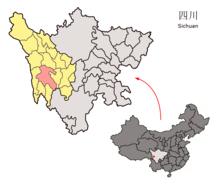Litang County
| Litang County | |
|---|---|
| County | |
| Chinese transcription(s) | |
| • Simplified | 理塘县 |
| • Traditional | 理塘縣 |
| • Pinyin | Lǐtáng Xiàn |
| Tibetan transcription(s) | |
| • Tibetan script | ལི་ཐང་རྫོང |
| • Wylie | li tang rdzong |
| • THL | Litang Dzong |

Yaks in the Ganden Thubchen Choekhorling monastery courtyard
|
|
 Litang County (red) in Garzê Prefecture (yellow) and Sichuan |
|
| Location of the seat in Sichuan | |
| Coordinates: 30°00′N 100°16′E / 30.000°N 100.267°ECoordinates: 30°00′N 100°16′E / 30.000°N 100.267°E | |
| Country | China |
| Province | Sichuan |
| Autonomous prefecture | Garzê Tibetan Autonomous Prefecture |
| County seat | Litang Town |
| Elevation | 3,954 m (12,972 ft) |
| Population (2001) | |
| • Total | 47,500 |
| Time zone | China Standard (UTC+8) |
| Website | litang |
Litang or Lithang County (Wylie: ལི་ཐང་རྫོང; Chinese: 理塘县) is in southwest of Garzê Tibetan Autonomous Prefecture, Sichuan, China. In 2001 it had a population of 47,500.
Before the Battle of Chamdo, Lithang was part of Kham, Tibet, and several famous Buddhist figures were born here, including the 7th Dalai Lama, the 10th Dalai Lama, the 11th Tai Situpa, four of the Pabalas, as well as the 5th Jamyang Zhépa of Labrang Monastery. Düsum Khyenpa, 1st Karmapa Lama, returned here and built two monasteries, Kampo Nénang Monastery next to the Genyen Massif, where he trained the important Kagyu teacher, Drogön Rechen (Wylie: 'gro mgon res pa chen po, 1148-1218) who recognised his tulku, and the Pangphuk Monastery, founded in 1169.
It also has strong connections with the eponymous hero of the Epic of King Gesar,
During the 1950s, the region around Litang was one of the main areas of Tibetan armed resistance to the presence of the People's Liberation Army. A resistance group called the Chushi Gangdruk was active in the area. In 1956 the monastery in Litang was bombed by the PLA.
...
Wikipedia

